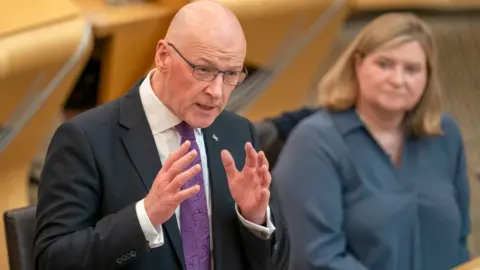In a recent announcement, First Minister John Swinney made a significant commitment to address the pressing issue of access to General Practitioner (GP) appointments in Scotland, which he referred to as an “08:00 lottery.” Under the initiative, NHS Scotland is set to deliver an additional 100,000 GP appointments over the course of the next year. This decision comes as part of Swinney’s broader programme for government, unveiled 12 months ahead of the Holyrood election scheduled for May 2026. Emphasizing that the National Health Service (NHS) will be at the core of the legislative and policy agenda, Swinney also outlined other measures to improve public services, such as permanently scrapping peak rail fares and lifting an alcohol ban on ScotRail trains.
The British Medical Association (BMA), which represents doctors in Scotland, expressed skepticism regarding the effectiveness of the additional 100,000 appointments in resolving the challenges surrounding early morning booking rushes. They noted that while the additional capacity appears beneficial, it may not fundamentally change the “lottery” characteristic of appointment scheduling that has frustrated many patients. The BMA pointed out that, on average, GP surgeries in Scotland currently offer about 650,000 appointments weekly, and the increase would only account for approximately a single day of added capacity throughout the year.
As a part of Swinney’s government agenda, he not only addressed the concerns related to healthcare but also spoke about transportation policies and rail fare adjustments, stressing the importance of easing economic burdens on citizens. The proposal to abolish peak fares correlates with a commitment to promote public transport, thus promoting environmentally friendly practices by reducing carbon emissions. Specific changes, such as modifying alcohol bans on ScotRail, are also indicative of efforts to create a more accommodating atmosphere for passengers.
The reception of Swinney’s proposal at the Scottish Parliament reflected a mix of critique and cautious optimism. Opposition parties, such as the Conservatives and Labour, described his announcement as lacking in innovative policy, instead suggesting it was merely a reiteration of existing commitments. Labour leader Anas Sarwar sharply criticized the government’s track record, asserting that it had squandered resources while failing to meet the public’s expectations.
Moreover, Swinney’s government aims to tackle child poverty—a priority area that has seen previous targets unmet. The First Minister pledged to publish a child poverty action plan for the years 2026 to 2031, signifying an ongoing commitment to address the socio-economic challenges that many families in Scotland face, particularly amid the rising cost-of-living crisis.
In an attempt to stimulate the economy further, Swinney announced the introduction of a “six-point export plan,” aimed at enabling Scottish exporters to diversify effectively in their markets. The focus on sustainable practices is also highlighted by plans to increase funding for carbon capture projects, reflecting the Scottish government’s broader commitment to environment-related initiatives.
With the political landscape in Scotland dynamic and varied, Swinney’s announcement signals a pivotal moment as he looks to address pressing public concerns while preparing for upcoming elections. Balancing the demands of ordinary citizens with the bureaucratic processes of government remains an ongoing challenge. Stakeholders from various sectors, including health and business, will be keenly watching the implementation of these proposed measures and their impact on the public’s well-being.
In summary, the multifaceted approach that Swinney has outlined seeks to not only address healthcare access but also encompass economic stability and environmental sustainability. Moving forward, the Scottish government faces the challenge of not merely making promises but also delivering tangible results that resonate with the electorate’s expectations in the lead-up to the next election.
As Swinney contends with these challenges, the anticipation surrounding these initiatives will likely influence the political discourse in Scotland leading to May 2026, where the ability to convert these promises into effective policies will ultimately determine public trust and electoral outcomes.



